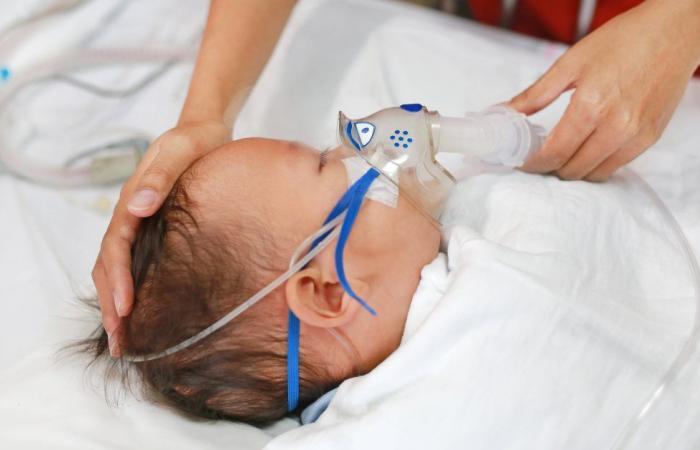Every year, with the arrival of fall and cooler temperatures, a threat looms over the health of infants: bronchiolitis.
This acute respiratory infection, mainly caused by the respiratory syncytial virus (RSV), affects 30% of babies under two years of age in France.
Between November and February, the epidemic peak can then lead to difficult situations, such as hospitalizations.
“In pediatrics, the bronchiolitis epidemic represents the equivalent of the Covid crisis“, underlines Professor Lisa Giovannini-Chami, head of the pediatric medicine department, pneumo-allergist, on the occasion of the press conference organized this Wednesday at Lenval hospital around the prevention campaign against RSV ( 1).
We take stock.
1. Beyfortus preventive treatment is available again
After its launch last year, Beyfortus preventive treatment (Sanofi) has been available in France since September 15 for all infants under one year old. This is a preventive treatment by intramuscular injection into the baby’s thigh.
“The duration of protection is at least 5 months. It is therefore recommended to carry out this injection now to be protected during the epidemicPR details Lisa Giovannini-Chami.
“Different from a vaccine, its role is to inhibit the essential step of viral penetration into the cell, this is how it neutralizes the virus.”
2. It concerns children under one year old
The Beyfortus medicine has been offered to all newborns in health establishments with maternity wards since September 15, 2024.
For those born after January 1, 2024, parents with a prescription can now purchase a dose in a pharmacy, for injection in town (2).
This year, an extension of the Beyfortus indication was granted for children under 24 months of age who remain at risk of severe RSV infection during their second season of exposure to the virus.
3. Demonstrated effectiveness
Estimates from the “Matisse” study show a significant reduction in severe respiratory infections linked to RSV thanks to preventive treatment: 81.8% at 3 months, 69.4% at 6 months. A reduction in hospitalizations is also observed: 67.7% at 3 months, 56.8% at 6 months.
“Regarding the tolerance of the vaccine, no increase in serious adverse events has been reported either in the mother or in the newborn.“, aided by PR Lisa Giovannini-Chami.
Last year, in the Paca region, between September and the end of December 2023, more than 9,800 infants received this preventive treatment after leaving the maternity ward, or more than 72% of newborns over this period.
“And this preventive campaign was felt in the Lenval emergency room with a 37% reduction in hospitalizations for RSV bronchiolitis and a 50% reduction in patients in intensive care for this same disease. This represents 110 fewer patients hospitalized due to bronchiolitis in our establishment and 360 hospital days saved.”
4. 600,000 doses available
Announced with great fanfare by the Ministry of Health last year, the Beyfortus monoclonal antibody was a victim of its success and it was difficult to obtain it in pharmacies.
“This year, Sanofi has planned 600,000 doses in France, more than twice the number of doses distributed last year. In Paca, we cannot give a precise number but – what is certain – is that there will be enough doses and no risk of shortage“, reassures Romain Alexandre, Director of the departmental delegation of the Regional Health Agency (ARS) Paca.
Even though Lenval hospital does not have a maternity ward, the establishment also has an endowment. “This allows us to quickly protect our most fragile young patients.” complete the PR Lisa Giovannini-Chami.
5. The campaign now includes vaccination of pregnant women
Since this year, the prevention of RSV infections can be anticipated from pregnancy: a vaccine (Abrysvo) is now available to immunize the mother, with a recommendation for administration between the 32nd and 36th week of amenorrhea. “This allows antibodies to be transmitted to the baby via the placenta, before he or she comes into the world.”
On the other hand, for vaccination to be effective, a period of at least 14 days before birth must be respected. “In this case, it will be recommended to immunize the child with Beyfortus at birth. Precise PR Lisa Giovannini-Chami.
This vaccine is available in town and in hospitals and is covered by social security.
1. Also in the presence of Céline Metge, deputy director of Lenval hospital and Dr Sébastien Barthélemy, head of the intensive care and continuous monitoring department, resuscitator.
1. In the maternity ward, Beyfortus is 100% supported. In town, it is reimbursed by Health Insurance up to 30% (the remainder payable is 286 euros for people who do not have mutual insurance).
Who is affected?
Beyfortus has been available since September 15 in France for all infants without serious risk factors experiencing their first season of exposure to RSV (respiratory syncytial virus), that is to say for this year, those born from January 1, 2024.
Babies born between September 15, 2023 and March 1, 2024 can ideally be vaccinated in the maternity ward or hospital before their discharge. For those who are not, a prescription made by the maternity ward, pediatricians, general practitioners and midwives will allow you to obtain a dose.






